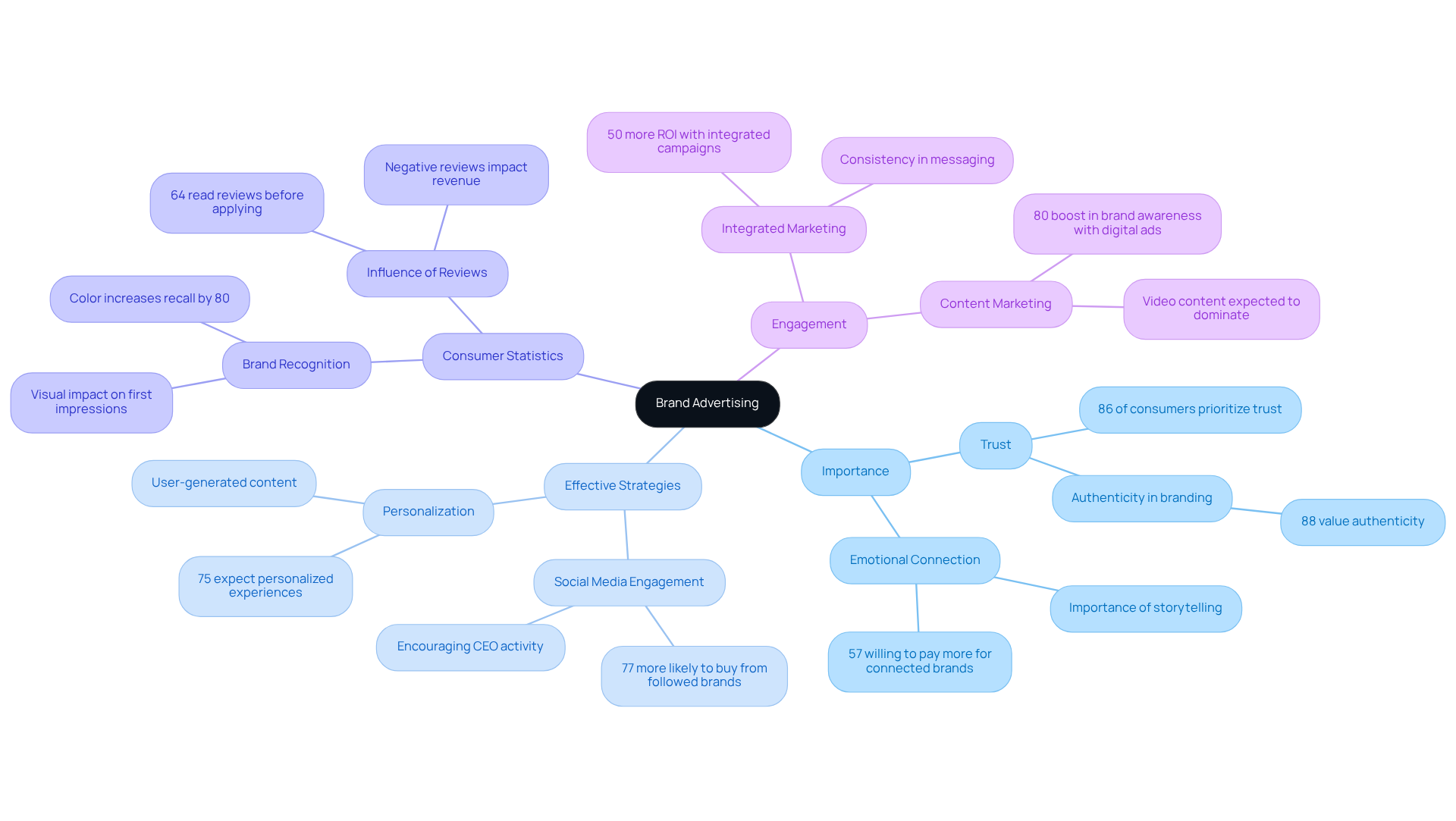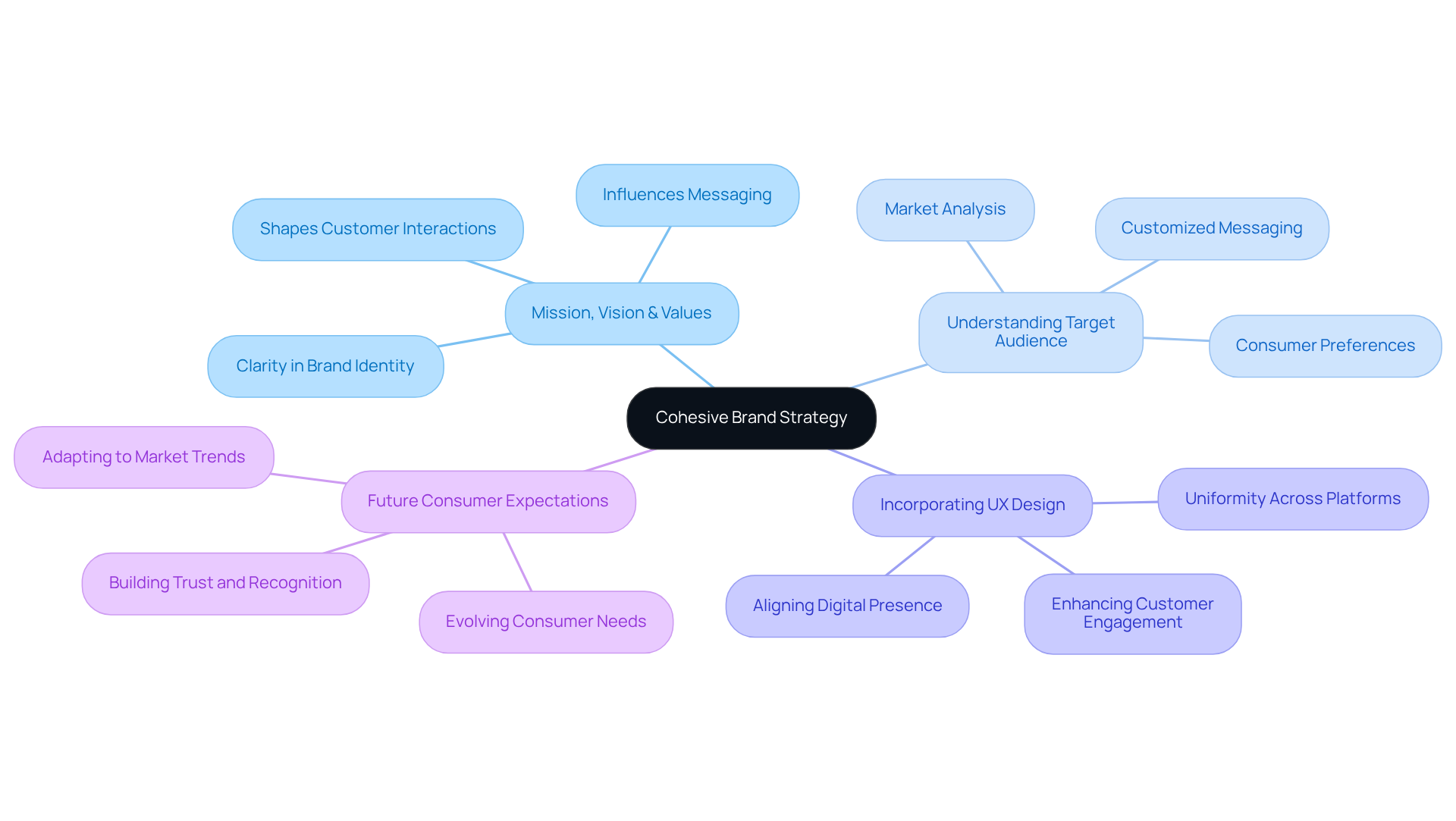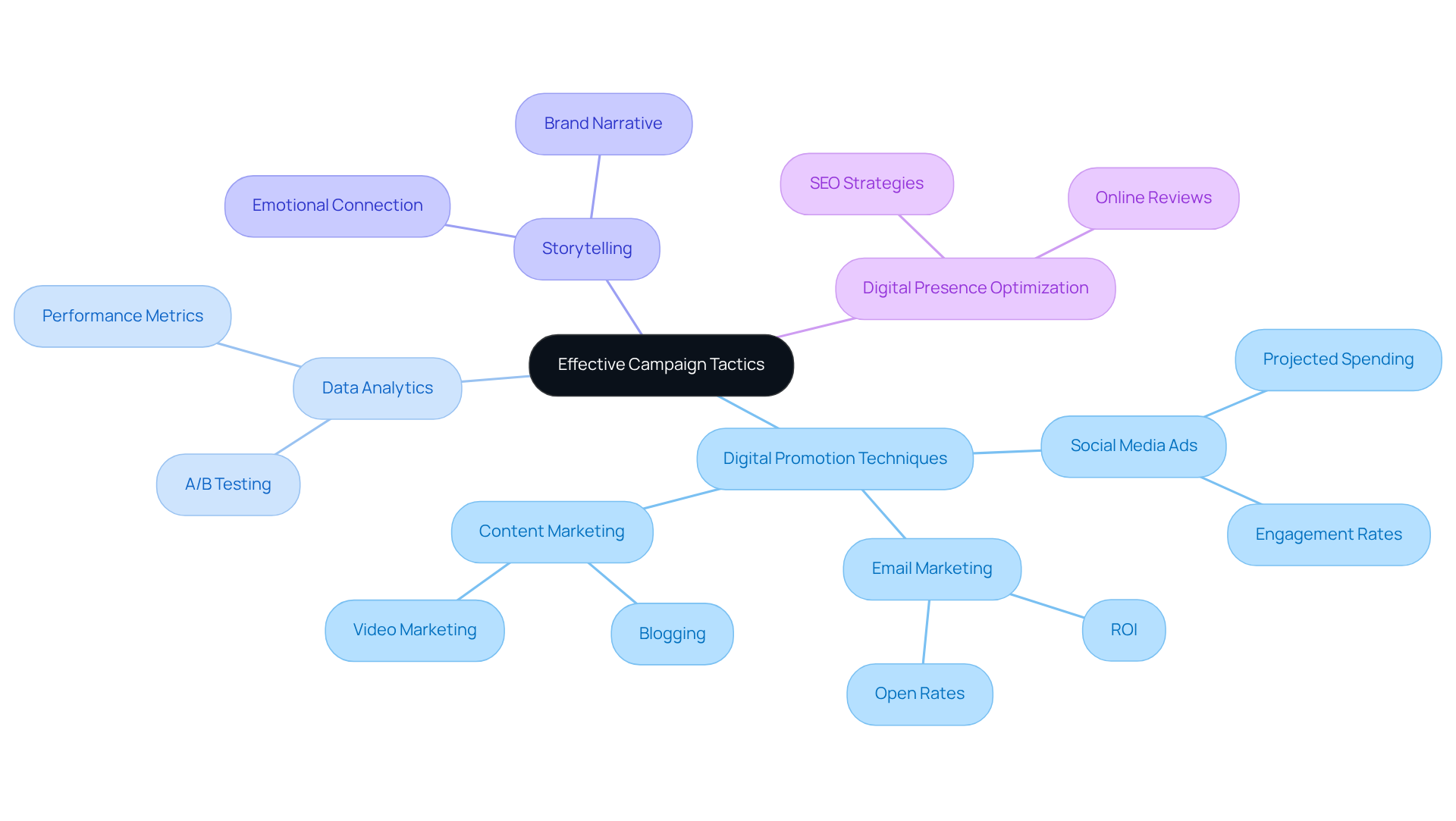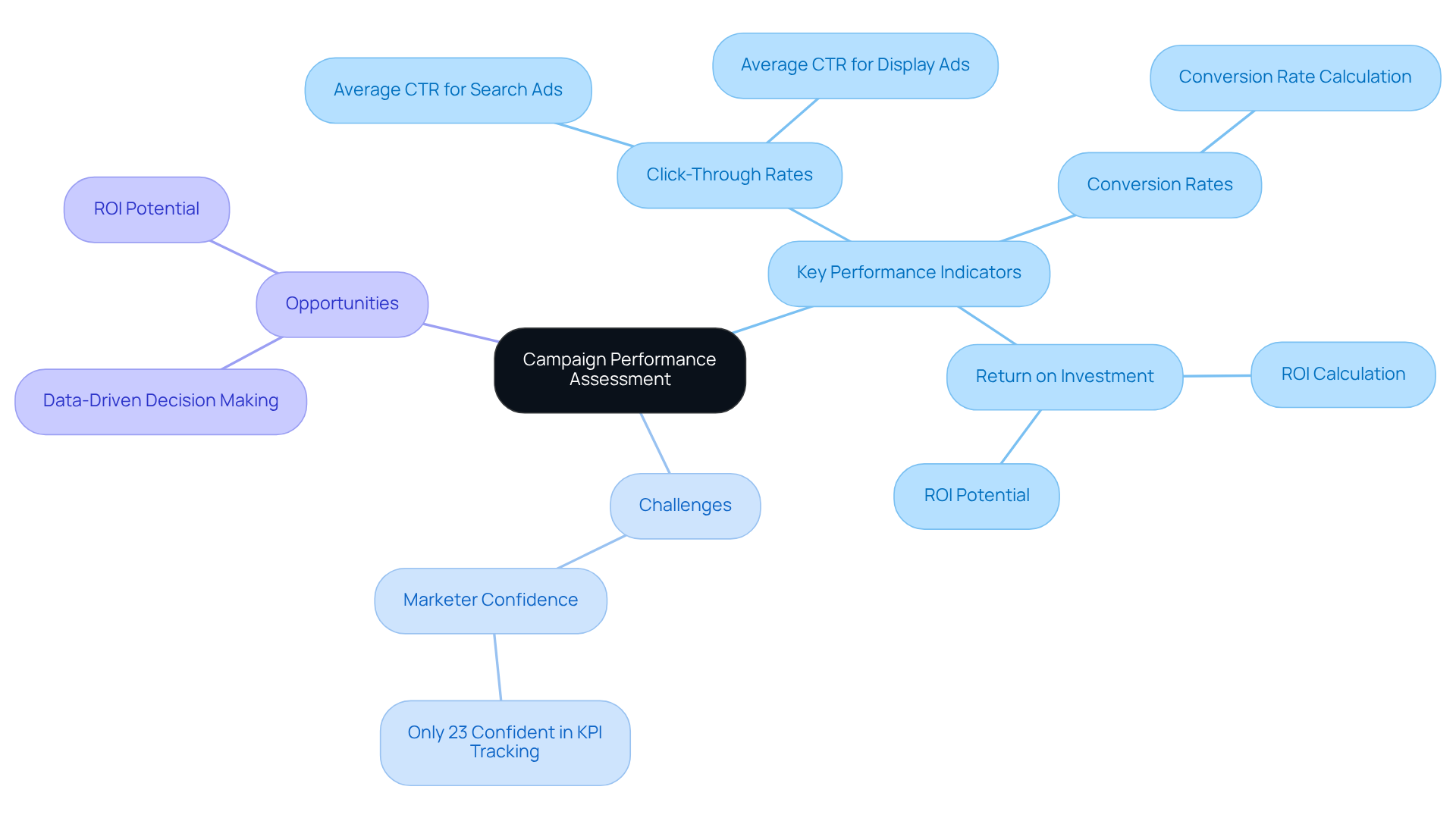Overview
In today's competitive landscape, many tech startup founders struggle with the challenge of effective brand advertising. This can lead to frustration, as they may find it difficult to connect with their audience and build lasting relationships. The implications of this problem are significant; without a cohesive brand strategy, targeted campaign tactics, and proper performance measurement, startups risk losing potential customers and valuable loyalty.
However, there is hope. By implementing four best practices for brand advertising, founders can transform their approach and foster deeper connections with their audience.
-
A well-defined brand identity is essential. It creates a foundation for personalized messaging that resonates with customers, enhancing their engagement. Evidence shows that when brands communicate authentically, they cultivate loyalty and trust.
-
Data-driven performance analysis is crucial. This practice allows founders to refine their strategies continually, ensuring that their campaigns are not just effective but also adaptable to changing market dynamics. By measuring performance, they can identify what resonates with their audience and adjust their tactics accordingly.
As you navigate this journey, remember that you are not alone. Many have faced these challenges and found success through thoughtful branding strategies. Together, we can explore these practices and create a supportive environment that nurtures your brand's growth and connection with your customers.
Introduction
In a landscape where consumer trust is paramount, many tech startup founders find themselves grappling with the daunting challenge of standing out in the crowded realm of brand advertising. It’s more pressing than ever to enhance visibility while also fostering meaningful connections that drive customer loyalty and engagement.
As you navigate this complex terrain, you may wonder:
- How can you create campaigns that resonate deeply with your audience?
- What strategies will ensure your brand not only captures attention but also inspires trust?
This article delves into the best practices for crafting impactful brand advertising campaigns, offering the insights you need to thrive in an increasingly competitive market. Together, we can explore ways to build that essential trust and connection with your audience.
Define Brand Advertising and Its Importance
Promotional efforts can often feel overwhelming for tech startup founders, as they seek to enhance their company's identity, values, and products. This journey is crucial for creating awareness and nurturing customer loyalty, yet it can be challenging to distinguish a brand from its competitors. At RNO1, we understand that effective product advertising goes beyond mere visibility; it's about achieving measurable success through collaborative strategies that resonate with your target audience. In a world where 86% of U.S. individuals prioritize trust in the companies they choose, our results-oriented approach ensures that we remain focused on attaining meaningful outcomes from the outset.
This commitment to design-driven solutions allows us to cut through the noise, connecting with individuals on a deeper level. For instance, consider a technology startup that effectively communicates its unique value proposition through engaging promotional advertising. Such an approach can attract and retain customers more efficiently than its rivals. This is especially important when 57% of consumers express a willingness to pay more for brands they feel a connection to, and 88% value authenticity in marketing efforts. Furthermore, 77% of consumers are more inclined to purchase from companies they follow on social media, highlighting the power of personalized messaging and social media engagement.
By utilizing our Return On Design & Digital (RODD) strategies, we empower companies to enhance their marketability and boost engagement. This understanding is vital for creating effective advertising campaigns that resonate with your audience. Together, we can navigate this landscape, ensuring that your brand not only stands out but also builds lasting connections with consumers.

Develop a Cohesive Brand Strategy
To develop a unified branding approach, many companies face the challenge of clearly expressing their identity's mission, vision, and values. This foundational work is crucial, as it shapes every aspect of the brand's identity, influencing messaging, visual elements, and customer interactions. Without this clarity, businesses may struggle to connect with their audience, leading to missed opportunities for engagement and growth.
Understanding the target audience is vital, encompassing their preferences, behaviors, and challenges. For instance, a technology startup might find it beneficial to conduct market analysis to uncover specific audience needs. This insight can facilitate customized messaging and promotional efforts that truly resonate.
Moreover, incorporating UX design principles into the company strategy can significantly enhance customer engagement. When a brand’s digital presence aligns with its overall identity, it fosters a deeper connection with customers. Uniformity across all platforms—be it social media, website design, or promotional campaigns—becomes essential for building trust and recognition among customers.
As we look ahead to 2025, it’s important to recognize that consumer expectations will continue to evolve. Companies that prioritize these elements, embracing their unique identity while understanding their audience, will be better positioned to thrive in a competitive landscape. Together, we can navigate these challenges and create a brand that not only stands out but also resonates deeply with those we aim to serve.

Implement Effective Campaign Tactics
In the journey of implementing successful promotional campaigns, tech startup founders often find themselves facing the daunting task of selecting the right channels and formats to connect with their target audience. This challenge can feel overwhelming, especially when trying to convey a compelling message that resonates. A diverse mix of digital promotion techniques—like social media ads, email marketing, and content marketing—can significantly enhance reach and make a difference. For instance, technology startups can effectively leverage platforms like LinkedIn to engage with industry professionals, crafting tailored content that speaks directly to their specific needs and concerns.
Data analytics emerge as a vital ally in refining these promotional strategies. They empower companies to identify which campaigns are thriving and which areas need a little extra attention. By implementing A/B testing for different ad creatives or messaging, founders can uncover valuable insights into audience preferences, leading to more effective targeting. Furthermore, weaving storytelling into promotional activities helps foster an emotional bond with customers, making the company feel more relatable and unforgettable.
As the landscape of digital promotion continues to evolve, embracing these strategies can guide tech startups through the competitive environment, boosting brand awareness and connection. With 93% of online interactions beginning with a search engine and 97% of users checking a business’s online presence before visiting, optimizing digital presence becomes essential for capturing consumer attention. Moreover, social media promotions are projected to surpass $230 billion, underscoring their importance in effectively reaching target audiences. In fact, 58% of small businesses rely on digital marketing to connect with customers, reflecting a broader trend toward digital marketing adoption. By focusing on these optimal methods, tech startups can enhance their promotional impact and nurture sustainable growth.

Measure and Analyze Campaign Performance
To effectively assess and evaluate campaign performance, many tech startup founders face the challenge of establishing clear key performance indicators (KPIs) that truly align with their promotional objectives. This can often feel overwhelming, especially when essential metrics like click-through rates (CTR), conversion rates, and return on investment (ROI) come into play.
For instance, did you know that the average CTR for search ads is approximately 6.6%, while display ads hover around 0.6%? It's concerning to note that only 23 percent of marketers feel confident that they track the right KPIs, highlighting the pain of navigating this complex landscape.
However, there is hope: agencies can achieve up to 368% ROI through effective KPI selection, which offers a compelling incentive for founders to prioritize KPI establishment in their advertising strategies. By employing analytics tools, such as those provided by Improvado, companies can access over 500 data sources for marketing information and attain an impressive 99.9% data precision. This enables real-time monitoring of these crucial metrics.
If an ad underperforms, it's vital to explore the data to identify potential issues, such as misaligned targeting or ineffective messaging. Regular performance reviews not only optimize current efforts but also yield valuable insights for future campaigns. By cultivating a culture of data-driven decision-making, brands can continuously refine their advertising strategies, ultimately enhancing their effectiveness and achieving superior results over time.
Remember, you’re not alone in this journey; together, we can navigate the complexities of campaign performance and drive your success forward.

Conclusion
In the competitive landscape of tech startups, effective brand advertising campaigns are not just beneficial; they are essential for carving out a unique niche. Many founders struggle with visibility and fostering loyalty, which can feel overwhelming. However, by focusing on:
- Building trust
- Developing a cohesive brand strategy
- Implementing targeted tactics
- Measuring campaign performance
companies can create meaningful connections with their audience. This journey is about more than just visibility; it’s about nurturing loyalty and establishing a distinctive identity that truly resonates with consumers.
To navigate these challenges, several best practices can guide your efforts.
- Defining your brand's identity is crucial, as it allows you to communicate your values clearly.
- Understanding your target audience ensures that your messaging is relevant and impactful.
- By utilizing a variety of promotional tactics—from social media to data analytics—you can enhance engagement and optimize your reach.
- Moreover, establishing key performance indicators empowers you to measure effectiveness and make informed adjustments to your strategies.
In a rapidly evolving market, embracing these best practices is imperative for lasting success. Authenticity and connection should be prioritized in your advertising efforts, as these elements are increasingly valued by consumers. By adopting a strategic approach to brand advertising, tech startups can not only stand out but also build enduring relationships that drive growth and sustainability in the years to come.
Remember, you are not alone in this journey; together, we can navigate the challenges and celebrate the successes that lie ahead.
Frequently Asked Questions
What is brand advertising?
Brand advertising refers to promotional efforts aimed at enhancing a company's identity, values, and products to create awareness and nurture customer loyalty.
Why is brand advertising important for tech startups?
Brand advertising is crucial for tech startups as it helps distinguish their brand from competitors, enhances visibility, and fosters measurable success through strategies that resonate with their target audience.
What percentage of U.S. individuals prioritize trust in companies?
86% of U.S. individuals prioritize trust in the companies they choose.
How does effective product advertising benefit a technology startup?
Effective product advertising helps a technology startup communicate its unique value proposition, attracting and retaining customers more efficiently than its rivals.
What do consumers value in marketing efforts?
88% of consumers value authenticity in marketing efforts, and 57% are willing to pay more for brands they feel a connection to.
How does social media engagement influence consumer purchasing behavior?
77% of consumers are more inclined to purchase from companies they follow on social media, highlighting the importance of personalized messaging and social media engagement.
What strategies does RNO1 use to enhance marketability?
RNO1 utilizes Return On Design & Digital (RODD) strategies to empower companies to enhance their marketability and boost engagement with their audience.




